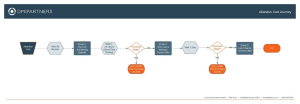
In 2007, Jeffrey Pfeffer, Professor of Organizational Behavior at Stanford University, published a book titled, What Were They Thinking? Unconventional Wisdom About Management. He made this statement about delegation:
“Your most important task as a leader is to teach people how to think and ask the right questions so that the world doesn’t go to hell if you take a day off.”
This is as true today, ten years later, as it was then.
Delegation is one of the hardest things for a small business owner to execute as his enterprise scales. He has been used to doing everything by himself; this business is his “baby,” and there are functions that are just too important to let anyone else handle. It’s just too risky.
The Dangers of Not Delegating
As a business scales, tasks become larger and more complex. There are more customers who have demands and who must be nurtured; marketing for continued growth means executing new strategies, tapping into more venues, and creating more content; managing the budget, receivables, invoices, inventory, etc. take more time. The CEO who continues to think that he is the only one who can really do all of this is headed for greater stress, anxiety, and, quite frankly, more time commitment than is possible.
Inevitably, things go wrong. Customer communication breaks down; schedules for content marketing fall apart; product is not available when purchases come in; and the essential functions of the business begin to crack. And when these things happen, revenue is inevitably impacted negatively. Customers may begin to look elsewhere for their solutions; customers whose issues have not been resolved will “trash” the company on social media.
And this is not just a problem for young businesses. A study on delegation, reported in the Harvard Business Review, found that, of 332 companies surveyed, over half were worried about their leaders not delegating, but only 28% of them actually trained those in leadership roles in the basics of delegation. The bottom line is, leaders do not have a plan and a process for delegating and therefore don’t do it.
Virtual and Human Delegation
Small business owners will inevitably hire or contract for additional staff as they scale. These will include a larger sales force, perhaps a marketing director, a bookkeeper, an accountant, and a customer relations pro. Some of this “staff” may actually be digital – a new accounting software package or an automated marketing tool. This is an easy form of delegation, once the software is mastered.
But there are still human tasks that cannot be delegated to a digital assistant. Live bodies will have to be employed or contracted for certain functions. It becomes the owner’s task, then, to figure out what can be delegated and how it should be delegated.
Determining What to Delegate
Here is a process for figuring out what can be delegated that many find useful.
- First, the business owner must have a clear idea of all of the tasks that he completes over a several-day period of time. This means keeping a journal of sorts – perhaps over a 10-day period.
- Second, a synthesized list can be generated. There will be tasks that are duplicates (e.g., responding to customer issues or writing that blog post). The end list will be a compilation of tasks.
- Third, take that list and determine those functions that only can and should be assumed by yourself – perhaps meeting with prospective customers/clients or continuing to nurture the biggest customers/clients, attending trade shows, etc. those tasks should be eliminated from the list.
- Fourth, look at the remaining tasks on the list and divide them into categories: those that you really hate doing; those that are mundane and tedious, etc. These are the tasks that can be delegated. Now you know the “what” should be delegated. The next job is “how” they are to be delegated.
Determining How to Delegate
From this list of tasks, decide which will have digital, combination digital/human, and only human solutions. Put the tasks under one of these three columns.
- Digital Solutions: This requires some digging on your part, in order to find the software solutions that will meet your needs. While this may take time up front, consider the amount of time saved once they are in place, and all of that manual work is off of your desk. Just using a social mention tool, for example, will alert you when your brand is mentioned anywhere on the web, and you can just access that mention and determine if you need to respond. Suppose you had an email marketing tool that would automate your emails, personalize them, and send them out to segments of leads, prospects, and customers, based on where they are in your sales funnel.
- Combination Digital/Human Solutions: Getting the accounting and bookkeeping functions off of your back, along with perhaps inventory control, will be a huge time saver for you. You may have been using a piece of software that has worked but is now just not deep enough. Looking for new software as well as someone who has the familiarity and skill to use it, could be huge.
- Human Solutions: As you scale, there are some things that only you could do and now that someone with the right skills can do for you. Take content marketing, for example. You may have had full responsibility for producing all of your content, for searching for the right topics, for entertaining and inspiring your audience and for making sure that you post that content in the right places, at the right times, and on a regularly scheduled basis. It keeps you up at night because you are too busy during the day with other functions. Here is something that you can delegate to a freelance contractor or, if the budget allows, a new employee. If you can find a reputable freelancer, firm, or employee who is a skilled content marketer, what a load off of your shoulders.
Some Tips for Delegating to Your Team
There are important things to consider when you delegate – after all your reputation and your continued success relies at least in part on their success. Here are a few tips that may guide you.
- Choose people for a task who you believe are a good match. Even if you will then be teaching them, if you believe they can master what must be done, it is a good choice. And if you indicate to them that you have faith in their ability to take on this task, they will almost always rise to the occasion. People do live up to our expectations of them.
- Define the task(s) clearly – sometimes in writing – so that everyone understands what must be done and how it must be done. This includes deadlines. And the person to whom you are delegating should understand why the task is important and what it contributes to the larger picture. People take ownership when they see their contribution to the well-being of an organization.
- Do track progress. You should never be a hovering manager. Instead of hovering and micro-managing, as for progress to be sent to you on a schedule you determine. This puts the responsibility squarely on the delegee, and lets them know that you have faith in their ability to get it done.
- Don’t demand that the delegee do it your way. It’s fine to show someone how you completed certain tasks, but you have to allow others to develop their own procedures – give them the goal and the resources, and then give the flexibility
- Be a problem-solver, not a dictator. When you delegate tasks, your delegees may run into challenges. Be certain they know that you are there as a resource, not as a critic. How you respond to a roadblock someone else hits will determine whether they are willing to come to you in the future.
- Show your appreciation. Bring in lunch. Order dinner if people have to work late; celebrate met deadlines; when others go above and beyond, give them a day off. Send personal emails or notes of thanks. Of course, pay raises and even bonuses are great rewards, if you can afford it.
Delegating for the first time will challenge you in many ways. You are giving up control; you are entrusting your reputation and at least a part of your livelihood to others; but you are also learning to communicate better, to collaborate better, and to give others a stake in this business that is your passion. And the best part? You can take a day off or a vacation once in awhile!
Business & Finance Articles on Business 2 Community(89)
Report Post






